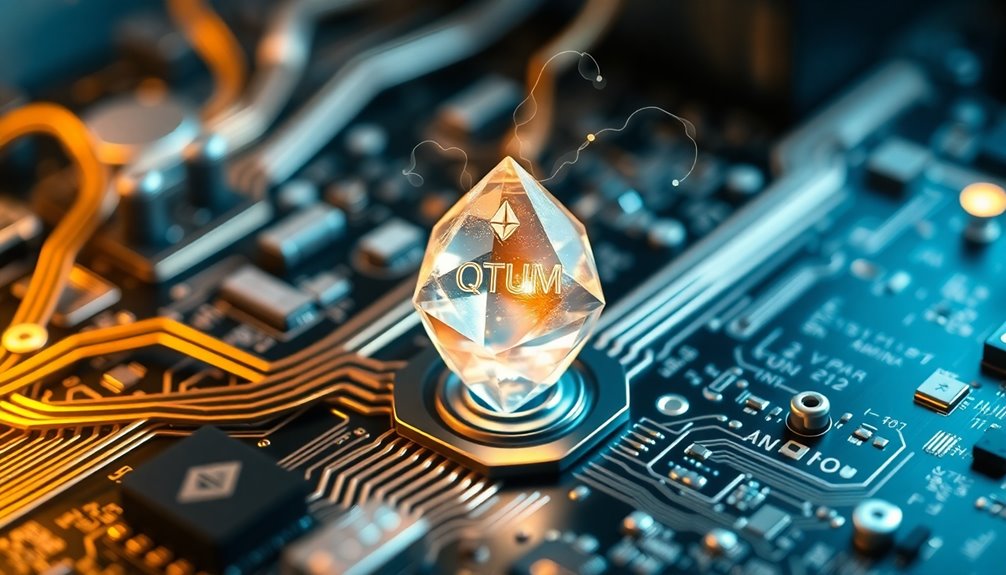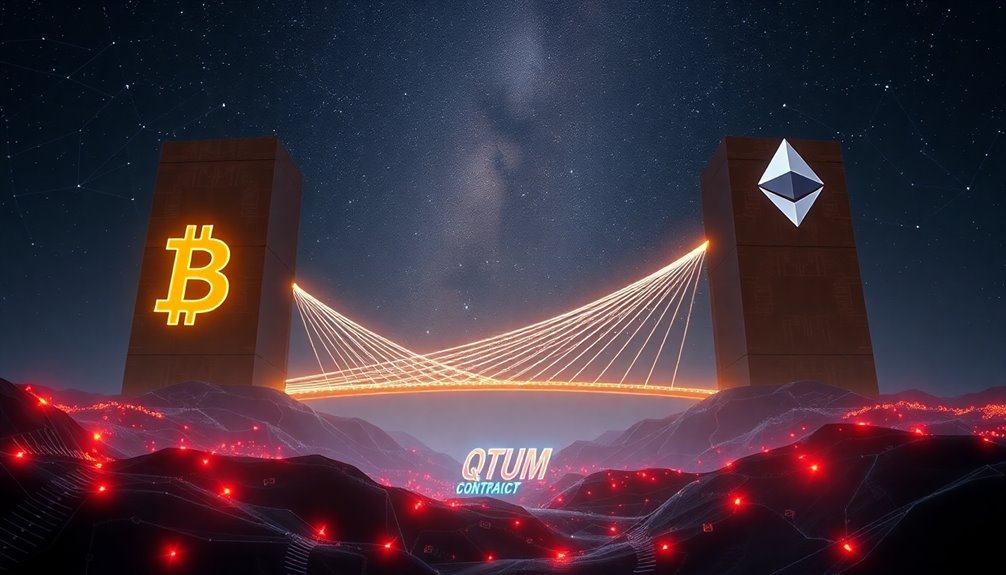QTUM is a unique blockchain platform that blends the security of Bitcoin with the smart contract capabilities of Ethereum. Imagine having a secure way to manage transactions while also being able to create powerful applications! QTUM uses a hybrid model, combining both Bitcoin's unspent transaction output (UTXO) and Ethereum's features. This flexibility means you can easily create smart contracts that run automatically and securely. Plus, QTUM supports high transaction speeds and is eco-friendly via its proof-of-stake mechanism. There's so much innovative potential here, and if you stick around, you'll uncover even more exciting aspects of QTUM!
Key Takeaways
- QTUM is a blockchain platform that combines Bitcoin's UTXO model with Ethereum's smart contract capabilities for enhanced functionality.
- It utilizes a Proof-of-Stake consensus mechanism, promoting energy efficiency and rewarding users for staking QTUM coins.
- The platform's Account Abstraction Layer enables smooth operation and execution of smart contracts using Solidity programming language.
- QTUM supports cross-chain atomic swaps, allowing seamless exchanges between QTUM and Ethereum without relying on centralized exchanges.
- Its decentralized governance protocol empowers users to participate in decision-making, ensuring adaptive and community-driven blockchain development.
Core Concepts of QTUM

At the heart of QTUM lies a blend of innovative technologies designed to enhance both security and functionality.
One key feature is the Unspent Transaction Output (UTXO) model, which tracks unspent coins, ensuring each transaction is secure and accurate. This model's design is reminiscent of quantum superposition, allowing for multiple transaction states to coexist until resolved.
You'll appreciate how this model works hand-in-hand with the Account Abstraction Layer (AAL), allowing smart contracts to run smoothly.
Plus, QTUM uses a Proof-of-Stake (PoS) consensus model, meaning you can earn rewards just by staking your QTUM.
Lastly, the Decentralized Governance Protocol (DGP) lets you and the community vote on important changes, keeping the blockchain adaptable without major disruptions.
Together, these concepts create a powerful, flexible platform that's ready for the future!
Overview of Qtum's Purpose

While many blockchain platforms focus on either security or functionality, Qtum uniquely combines the strengths of Bitcoin and Ethereum to serve a broader purpose.
This exciting platform offers high transactional security through Bitcoin's UTXO model, all while allowing smart contracts like Ethereum. Imagine executing complex tasks securely and efficiently!
With its impressive scalability, Qtum can handle around 1,100 transactions per second, making it much faster than Ethereum. Additionally, Qtum's proof-of-stake (PoS) consensus model simplifies coin mining and reduces energy consumption compared to traditional mining methods.
Plus, its energy-efficient Proof of Stake system means you can participate without needing powerful mining equipment.
You'll love the chance to be part of a community-driven network where your voice matters.
Qtum truly bridges the gap between these two giants, creating endless possibilities for decentralized applications!
Smart Contracts on Bitcoin Framework

Qtum's unique approach to smart contracts leverages the Bitcoin framework, offering a blend of security and functionality.
With Bitcoin Script, you can create custom transaction types, like escrow transactions or multi-party signatures. While it isn't as versatile as Ethereum's Solidity, it enhances security and predictability. The Pay-to-Taproot upgrade boosts privacy and efficiency, hiding complex spending conditions until bitcoins are spent. Your smart contracts can automatically execute actions when specific conditions are met, eliminating the need for third-party involvement. Additionally, these contracts offer flexibility for various transaction types, including payroll and royalties, enhancing blockchain-aligned business processes through efficiency and security. They can also communicate with one another, creating a dynamic environment. However, remember that Qtum focuses on ownership and transfer, making it less suited for complex tasks.
Still, its innovative features open exciting possibilities for smart contracts!
Pros and Cons

When evaluating Qtum, it's essential to weigh both its strengths and weaknesses.
On the plus side, Qtum's hybrid architecture combines Bitcoin's UTXO model and Ethereum's smart contracts, providing security and flexibility. It handles up to 1100 transactions per second, which is impressive! Plus, its decentralized governance lets the community have a say in decisions. Additionally, its scalability with approximately 1,100 transactions per second positions it as a competitive option in the blockchain space.
However, some challenges exist. As a newer platform, it mightn't have as much adoption or support as Bitcoin or Ethereum yet. Additionally, while its proof-of-stake mechanism is energy-efficient, some users might prefer the traditional proof-of-work model.
Bitcoin vs. Ethereum Features

Understanding the differences between Bitcoin and Ethereum can help you appreciate the unique features of each platform.
Bitcoin uses a Proof of Work (PoW) system, which requires miners to solve tough puzzles to validate transactions. In contrast, Ethereum now operates on Proof of Stake (PoS), allowing validators to create new blocks based on their token holdings, making it more energy-efficient. Additionally, this transition to Proof of Stake enhances Ethereum's scalability and security, distinguishing it further from Bitcoin.
Ethereum's block time is about 12 seconds, while Bitcoin takes around 10 minutes, leading to quicker transactions on Ethereum.
Plus, Ethereum supports smart contracts and decentralized applications, letting developers create exciting projects. Meanwhile, Bitcoin focuses on security and decentralization.
Both platforms have unique strengths that cater to different needs in the crypto world.
Regulatory Compliance Hurdles

Navigating the complex landscape of regulatory compliance can be daunting for hybrid blockchain systems like QTUM. You might face challenges like blockchain incompatibility, where different systems like Bitcoin and Ethereum don't always play nice together.
Ensuring smart contract security across these networks is crucial, too. With various regulatory frameworks, keeping up can feel like trying to juggle while riding a unicycle!
Regulatory uncertainty adds another layer, as guidelines are often unclear. You'll need to tackle Anti-Money Laundering (AML) and Know-Your-Customer (KYC) requirements, making customer verification a must. Implementing automated compliance solutions can significantly alleviate some of these burdens by streamlining processes.
Plus, staying ahead of cybersecurity risks is vital. By being proactive and establishing solid compliance measures, you can navigate these hurdles and foster a safer, more transparent environment for QTUM users.
Decentralized Finance Integration

Decentralized Finance (DeFi) integration on the QTUM platform empowers you to leverage the benefits of smart contracts and blockchain technology.
With QTUM's Ethereum Virtual Machine compatibility, you can easily create and deploy smart contracts for various DeFi applications. This means efficient transactions can happen quickly, all while keeping gas fees low thanks to its Proof-of-Stake consensus mechanism. Additionally, QTUM's lower gas fees compared to Ethereum make it an attractive option for high-frequency applications. The platform's decentralized nature enhances security and transparency, making it a reliable choice for DeFi projects.
Plus, the network's ability to handle high transaction volumes makes it perfect for large-scale projects. You'll also find helpful development tools and APIs that simplify building decentralized applications.
By participating in the Decentralized Governance Protocol, you can have a say in the community's future, ensuring that the platform evolves to meet your needs.
Dive in and explore the possibilities!
Utilize Qtum's Hybrid Model

By leveraging Qtum's hybrid model, you can unlock the full potential of both the Bitcoin and Ethereum ecosystems. This model combines the best features of both platforms, letting you create smart contracts in Solidity, just like on Ethereum. In addition, this approach allows for a tight coupling of classical and quantum architectures, enhancing the efficiency of your applications.
You can develop industry-specific applications, whether for healthcare or supply chains, making your projects more impactful. Plus, the integration of Bitcoin's UTXO model ensures seamless transactions.
With cross-chain atomic swaps, you can exchange tokens effortlessly between Qtum and Ethereum without needing a centralized exchange. This flexibility means you have more options, increased liquidity, and a smoother experience.
Embrace Qtum's hybrid model, and watch your innovative ideas flourish across multiple blockchain environments!
Frequently Asked Questions
How Does QTUM Ensure Network Security?
QTUM ensures network security by using a Proof of Stake system. You, as a token holder, can help make important decisions for the network, keeping it decentralized.
When you validate transactions, you earn new QTUM tokens! Plus, validators receive transaction fees, which keeps everyone motivated.
The network can handle a lot of transactions at once—up to 1,100—making it quick and efficient. This mix helps create a safe and strong environment for everyone involved!
What Programming Languages Can Be Used for QTUM Smart Contracts?
You might think smart contracts can only be crafted in a secret language, but guess what? You can use popular programming languages like Solidity, C++, and Python for QTUM smart contracts!
These languages make it super easy for you to jump in and start building. Plus, with support for Java and Rust, the options are endless.
Is QTUM Compatible With Other Blockchain Platforms?
Yes, Qtum's super friendly when it comes to other blockchain platforms!
It works well with Ethereum, letting you use smart contracts without any special tools. You can even swap tokens with Bitcoin and Ethereum easily.
Plus, you've got a single wallet to manage all your assets across different networks.
This means you can explore new projects and opportunities while enjoying the best of both worlds! Isn't that exciting?
What Wallets Support QTUM Cryptocurrency?
Imagine you're a treasure hunter, seeking the best places to store your precious QTUM coins.
You've got your trusty Qtum Core Wallet for desktop, and the Qtum Mobile Wallet for adventures on-the-go.
There's also the Qtum Web Wallet for quick access online.
If you prefer third-party options, MetaMask and Trust Wallet are great choices.
With hardware wallets like Ledger and Trezor, you can keep your QTUM safe, just like a treasure chest!
How Does QTUM Handle Scalability Issues?
QTUM tackles scalability issues in several clever ways!
First, it boosts transaction capacity by increasing block size, allowing for around 1,100 transactions per second. It uses a Proof-of-Stake system, making it more energy-efficient and secure.
Plus, QTUM's future plans include sharding, which splits the network into smaller parts for faster processing.
Finally, it integrates the Lightning Network, enabling speedy, low-cost transactions while keeping everything decentralized and secure.
Isn't that exciting?
Conclusion
In a world where Bitcoin is like a sturdy, reliable truck, and Ethereum is a sleek sports car, Qtum is the bridge that connects them. It combines the best of both, letting you drive through the best features of each. With its unique hybrid model, you're not just part of the crypto race; you're steering your own course. So, why not hop in and explore the exciting journey Qtum offers? You might just discover your new favorite ride!









